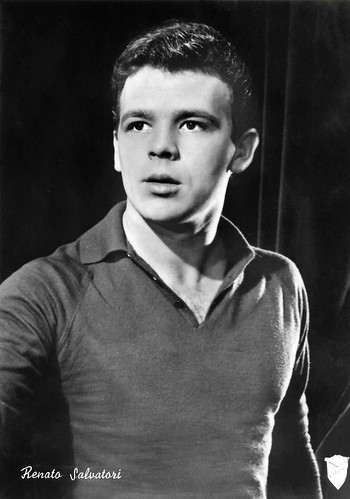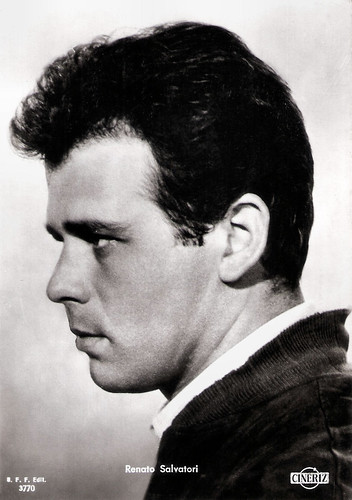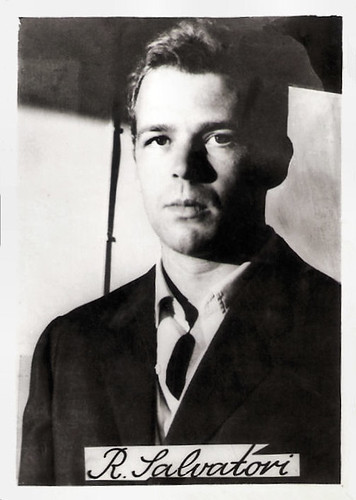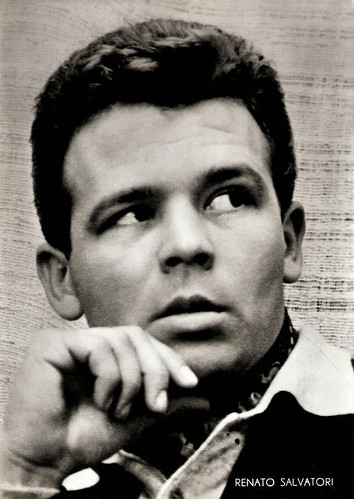Thanks to his good looks and impressive physique, Italian actor Renato Salvatori (1933-1988) became a popular star of the European cinema of the 1950s and 1960s. He started as a romantic juvenile actor and reached his apex as Simone in Luchino Visconti’s masterpiece Rocco e i suoi fratelli/Rocco and His Brothers (1960). In the 1960s, Salvatori turned into one of Italy's strongest characters actors of grim, harrowing drama.

Italian postcard by Bromofoto, Milano, no. 1296. Photo: Titanus.

Italian postcard by Bromofoto, Milano, no. 1301. Photo: Titanus.

Italian postcard by B.F.F. Edit. (Casa Editr. Ballerini & Fratini, Firenze), no. 3712. Photo: G.B. Poletto / Titanus. Publicity still for Poveri Millionari/Poor Millionaires (Dino Risi, 1959).

Italian postcard by B.F.F. Edit., no. 3770. Photo: Cineriz.
Renato Salvatori was born Giuseppe Salvatori in Seravezza, near Lucca, in 1933. He was the son of a marble mason.
When he was 18 and bay-watching at a small seaside resort near Forte dei Marmi, Salvatori was discovered by Italian film director Luciano Emmer. The handsome and muscular baywatch landed a part in the romantic drama Le ragazze di Piazza di Spagna/Girls of the Spanish Steps (Luciano Emmer, 1952) starring Lucia Bosé.
Salvatori had his first lead opposite May Britt in the adventure Jolanda la figlia del corsaro nero/Jolanda, the Daughter of the Black Corsair (Mario Soldati, 1954).
Salvatori’s popularity grew enormously thanks to his part of Salvatore in Dino Risi’s trilogy Poveri ma belli/A Girl in Bikini (1956), Belle ma povere/Poor Girl, Pretty Girl (1957) and Poveri milionari/Poor Millionaires (1958), also with Maurizio Arena and Marisa Allasio.
He also knew public success with the two-part comedy La nonna Sabella (Dino Risi, 1957) and La nipote Sabella (Giorgio Bianchi, 1958), next to Peppino de Filippo and Sylva Koscina.
Success was even bigger with the classic crime comedy I soliti ignoti/Big Deal on Madonna Street (Mario Monicelli, 1958) about a gang of clumsy burglars (including Vittorio Gassman, Marcello Mastroianni, Salvatori and others), while Claudia Cardinale played Salvatori’s girlfriend. Its success propelled the sequel Audace colpo dei soliti ignoti/Hold up à la milanaise (Nanni Loy, 1960), again with Gassman and Cardinale.

East-German postcard by VEB Progress Film-Vertrieb, Berlin, no. 1356, 1960. Retail price: 0,20 DM. Photo: Progress. Publicity still for Poveri ma belli/Poor But Beautiful (Dino Risi, 1957) with Renato Salvatori, Marisa Allasio and Maurizio Arena.

Small Czech collectors card by Pressfoto, Praha (Prague), 1965, no. S 101/3. Photo: Claudia Cardinale and Renato Salvatori in Audace colpo dei soliti ignoti/Fiasco in Milan (Nanni Loy, 1959).

Small Czech collectors card by Pressfoto, Praha (Prague), 1965, no. S 101/4. Photo: Claudia Cardinale and Renato Salvatori in Audace colpo dei soliti ignoti/Fiasco in Milan (Nanni Loy, 1959).

Small Czech collectors card by Pressfoto, Praha (Prague), 1965, no. S 101/5. Photo: Claudia Cardinale, Alain Delon, Max Cartier and Renato Salvatori in Rocco e i suoi fratelli/Rocco and His Brothers (Luchino Visconti, 1960)
Renato Salvatori was also a good dramatic actor in such films as I magliari/The Magliari (Francesco Rosi, 1959) with Alberto Sordi, La ciociara/Two Women (Vittorio De Sica, 1960) with Sophia Loren, and Era notte a Roma/Blackout in Rome (Roberto Rossellini, 1960) with Giovanna Ralli.
Salvatori’s fundamental part was that of Simone in Rocco e i suoi fratelli/Rocco and his Brothers (Luchino Visconti, 1960). Simone is the eldest brother of a fatherless and poor family from a village in southern Italy who come to Milan seeking a better life. When Simone’s girlfriend, the prostitute Nadia (Annie Girardot), prefers his younger brother Rocco (Alain Delon) to him, he rapes her in front of his brother.
Reduced to an outcast and ridiculed by his former friends after his boxing career has faltered - while that of Rocco is summiting - Simone takes revenge on Nadia. In real life, Salvatori and Girardot treated each other quite differently. Salvatori met her on the set of the film, they fell in love and married two years after. Salvatori also became close friends with Delon.
Other memorable performances of Salvatori’s film career were in Un giorno da leoni/A Day for Lionhearts (Nanni Loy, 1961), La banda Casaroli/The Casaroli gang (Florestano Vancini, 1962) and I compagni/The Organizer (Mario Monicelli, 1963).
He also played in polemic and counter-cultural films such as Smog (Franco Rossi, 1962), also with Girardot, the Science-Fiction comedy Omicron (Ugo Gregoretti, 1964), and Una bella grinta/The Reckless (Giuliano Montaldo, 1965), films that wanted to give an Italian answer to the French Nouvelle Vague.
Salvatori’s last important roles were in Queimada/Burn (Gillo Pontecorvo, 1969) starring Marlon Brando, and in La prima notte di quiete/Indian Summer (Valerio Zurlini, 1972), again next to Alain Delon.

East-German postcard by VEB Progress Film-Vertrieb, Berlin, no. 1019, 1959. Photo: G. B. Poletto.

East-German postcard by VEB Progress Film-Vertrieb, Berlin, no. 1595, 1962.

Spanish postcard by Ediciones Raker, Barcelona, no. 286, 1963. Retail price: 3 ptas.

Spanish postcard by Postal Oscarcolor, no. 394.
In France, Renato Salvatori also played major parts in the films Le glaive et la balance/The Sword and the Balance (André Cayatte, 1963) with Anthony Perkins and Jean-Claude Brialy, Les grands chemins/Of Flesh and Blood (Christian Marquand, 1963) with Robert Hossein, L’harem/The Harem (Marco Ferreri, 1967) with Carol Baker, and the political thriller Etat de siege/State of Siege (Costa-Gavras, 1972) starring Yves Montand.
He also had small parts in Costa-Gavras’ Z (1969) and Henri Verneuil’s Le casse/The Burglars (1971) starring Jean-Paul Belmondo.
In 1969 he also acted in the Mexican film Los recuerdos del porvenir/Memories of the Future (Artur Ripstein, 1969).
In the early 1970s, Salvatori also played in a few French police films which starred Alain Delon: Les granges brûlées/The Burned Barns (Jean Chapot, 1973) also with Simone Signoret, Flic Story/Cop Story (Jacques Deray, 1975) also with Jean-Louis Trintignant, Le gitan/The Gypsy (José Giovanni, 1975) also with Annie Girardot, and Armaguedon/Armageddon (Alain Jessua, 1977) also with Jean Yanne.
In the same years, Salvatori also played in Italian films about crime & politics such as Il sospetto/The Suspect (Franco Maselli, 1975) with Gian Maria Volonté, Cadaveri eccellenti/Illustrious Corpses (Francesco Rosi, 1976) with Lino Ventura, and Todo modo (Elio Petri, 1976). He also appeared in films on sexual politics such as La dernière femme/The Last Woman (Marco Ferreri, 1976).
After the mid-1970s, however, Salvatori’s parts became much smaller, as in films as Ernesto (Salvero Samperi, 1979) and Bernardo Bertolucci's La luna/Luna (1979) and La tragedia di un uomo ridicolo/The Tragedy of a Ridiculous Man (1981).
Salvatori’s last major parts were in the erotic drama La cicala/The Cricket (Alberto Lattuada, 1980), the comedy Asso/Ace (Castellano & Pipolo aka Franco Castellano, Giuseppe Moccia, 1981) with Adriano Celentano, and the drama Oggetti smarriti (Giuseppe Bertolucci, 1980) with Mariangela Melato.
Salvatori had one daughter with Girardot: Giulia Salvatori, who became an actress as well. In later years the couple separated but kept a good relation. Salvatori had a son Nils from his second marriage with German photo model Danka Schroeder.
In the 1970s Salvatori started to have drinking problems, possibly caused by his delusion over his shrinking career. In 1984 Renato Salvatori entered politics while working for the external relations of the Ministry of Transport, but by now he was physically declining because of liver cirrhosis, which eventually killed him in 1988. He was 55. His grandson, the son of Giulia Salvatori, is also named Renato Salvatori.

Small Romanian collectors card.

Italian postcard, no. 466.

Italian postcard by Rotalfoto, Milano, no. 757.
Short documentary Renato Salvatori Povero ma Bello. Source: Moviexperience (YouTube).
Trailer Rocco e i suoi fratelli (1960). Source: Raccetto (YouTube).
Sources: Hal Erickson (AllMovie), Wikipedia (Italian, French, and English), and IMDb.

Italian postcard by Bromofoto, Milano, no. 1296. Photo: Titanus.

Italian postcard by Bromofoto, Milano, no. 1301. Photo: Titanus.

Italian postcard by B.F.F. Edit. (Casa Editr. Ballerini & Fratini, Firenze), no. 3712. Photo: G.B. Poletto / Titanus. Publicity still for Poveri Millionari/Poor Millionaires (Dino Risi, 1959).

Italian postcard by B.F.F. Edit., no. 3770. Photo: Cineriz.
Handsome and Muscular Baywatch
Renato Salvatori was born Giuseppe Salvatori in Seravezza, near Lucca, in 1933. He was the son of a marble mason.
When he was 18 and bay-watching at a small seaside resort near Forte dei Marmi, Salvatori was discovered by Italian film director Luciano Emmer. The handsome and muscular baywatch landed a part in the romantic drama Le ragazze di Piazza di Spagna/Girls of the Spanish Steps (Luciano Emmer, 1952) starring Lucia Bosé.
Salvatori had his first lead opposite May Britt in the adventure Jolanda la figlia del corsaro nero/Jolanda, the Daughter of the Black Corsair (Mario Soldati, 1954).
Salvatori’s popularity grew enormously thanks to his part of Salvatore in Dino Risi’s trilogy Poveri ma belli/A Girl in Bikini (1956), Belle ma povere/Poor Girl, Pretty Girl (1957) and Poveri milionari/Poor Millionaires (1958), also with Maurizio Arena and Marisa Allasio.
He also knew public success with the two-part comedy La nonna Sabella (Dino Risi, 1957) and La nipote Sabella (Giorgio Bianchi, 1958), next to Peppino de Filippo and Sylva Koscina.
Success was even bigger with the classic crime comedy I soliti ignoti/Big Deal on Madonna Street (Mario Monicelli, 1958) about a gang of clumsy burglars (including Vittorio Gassman, Marcello Mastroianni, Salvatori and others), while Claudia Cardinale played Salvatori’s girlfriend. Its success propelled the sequel Audace colpo dei soliti ignoti/Hold up à la milanaise (Nanni Loy, 1960), again with Gassman and Cardinale.

East-German postcard by VEB Progress Film-Vertrieb, Berlin, no. 1356, 1960. Retail price: 0,20 DM. Photo: Progress. Publicity still for Poveri ma belli/Poor But Beautiful (Dino Risi, 1957) with Renato Salvatori, Marisa Allasio and Maurizio Arena.

Small Czech collectors card by Pressfoto, Praha (Prague), 1965, no. S 101/3. Photo: Claudia Cardinale and Renato Salvatori in Audace colpo dei soliti ignoti/Fiasco in Milan (Nanni Loy, 1959).

Small Czech collectors card by Pressfoto, Praha (Prague), 1965, no. S 101/4. Photo: Claudia Cardinale and Renato Salvatori in Audace colpo dei soliti ignoti/Fiasco in Milan (Nanni Loy, 1959).

Small Czech collectors card by Pressfoto, Praha (Prague), 1965, no. S 101/5. Photo: Claudia Cardinale, Alain Delon, Max Cartier and Renato Salvatori in Rocco e i suoi fratelli/Rocco and His Brothers (Luchino Visconti, 1960)
Rocco's Eldest Brother
Renato Salvatori was also a good dramatic actor in such films as I magliari/The Magliari (Francesco Rosi, 1959) with Alberto Sordi, La ciociara/Two Women (Vittorio De Sica, 1960) with Sophia Loren, and Era notte a Roma/Blackout in Rome (Roberto Rossellini, 1960) with Giovanna Ralli.
Salvatori’s fundamental part was that of Simone in Rocco e i suoi fratelli/Rocco and his Brothers (Luchino Visconti, 1960). Simone is the eldest brother of a fatherless and poor family from a village in southern Italy who come to Milan seeking a better life. When Simone’s girlfriend, the prostitute Nadia (Annie Girardot), prefers his younger brother Rocco (Alain Delon) to him, he rapes her in front of his brother.
Reduced to an outcast and ridiculed by his former friends after his boxing career has faltered - while that of Rocco is summiting - Simone takes revenge on Nadia. In real life, Salvatori and Girardot treated each other quite differently. Salvatori met her on the set of the film, they fell in love and married two years after. Salvatori also became close friends with Delon.
Other memorable performances of Salvatori’s film career were in Un giorno da leoni/A Day for Lionhearts (Nanni Loy, 1961), La banda Casaroli/The Casaroli gang (Florestano Vancini, 1962) and I compagni/The Organizer (Mario Monicelli, 1963).
He also played in polemic and counter-cultural films such as Smog (Franco Rossi, 1962), also with Girardot, the Science-Fiction comedy Omicron (Ugo Gregoretti, 1964), and Una bella grinta/The Reckless (Giuliano Montaldo, 1965), films that wanted to give an Italian answer to the French Nouvelle Vague.
Salvatori’s last important roles were in Queimada/Burn (Gillo Pontecorvo, 1969) starring Marlon Brando, and in La prima notte di quiete/Indian Summer (Valerio Zurlini, 1972), again next to Alain Delon.

East-German postcard by VEB Progress Film-Vertrieb, Berlin, no. 1019, 1959. Photo: G. B. Poletto.

East-German postcard by VEB Progress Film-Vertrieb, Berlin, no. 1595, 1962.

Spanish postcard by Ediciones Raker, Barcelona, no. 286, 1963. Retail price: 3 ptas.

Spanish postcard by Postal Oscarcolor, no. 394.
Drinking Problem
In France, Renato Salvatori also played major parts in the films Le glaive et la balance/The Sword and the Balance (André Cayatte, 1963) with Anthony Perkins and Jean-Claude Brialy, Les grands chemins/Of Flesh and Blood (Christian Marquand, 1963) with Robert Hossein, L’harem/The Harem (Marco Ferreri, 1967) with Carol Baker, and the political thriller Etat de siege/State of Siege (Costa-Gavras, 1972) starring Yves Montand.
He also had small parts in Costa-Gavras’ Z (1969) and Henri Verneuil’s Le casse/The Burglars (1971) starring Jean-Paul Belmondo.
In 1969 he also acted in the Mexican film Los recuerdos del porvenir/Memories of the Future (Artur Ripstein, 1969).
In the early 1970s, Salvatori also played in a few French police films which starred Alain Delon: Les granges brûlées/The Burned Barns (Jean Chapot, 1973) also with Simone Signoret, Flic Story/Cop Story (Jacques Deray, 1975) also with Jean-Louis Trintignant, Le gitan/The Gypsy (José Giovanni, 1975) also with Annie Girardot, and Armaguedon/Armageddon (Alain Jessua, 1977) also with Jean Yanne.
In the same years, Salvatori also played in Italian films about crime & politics such as Il sospetto/The Suspect (Franco Maselli, 1975) with Gian Maria Volonté, Cadaveri eccellenti/Illustrious Corpses (Francesco Rosi, 1976) with Lino Ventura, and Todo modo (Elio Petri, 1976). He also appeared in films on sexual politics such as La dernière femme/The Last Woman (Marco Ferreri, 1976).
After the mid-1970s, however, Salvatori’s parts became much smaller, as in films as Ernesto (Salvero Samperi, 1979) and Bernardo Bertolucci's La luna/Luna (1979) and La tragedia di un uomo ridicolo/The Tragedy of a Ridiculous Man (1981).
Salvatori’s last major parts were in the erotic drama La cicala/The Cricket (Alberto Lattuada, 1980), the comedy Asso/Ace (Castellano & Pipolo aka Franco Castellano, Giuseppe Moccia, 1981) with Adriano Celentano, and the drama Oggetti smarriti (Giuseppe Bertolucci, 1980) with Mariangela Melato.
Salvatori had one daughter with Girardot: Giulia Salvatori, who became an actress as well. In later years the couple separated but kept a good relation. Salvatori had a son Nils from his second marriage with German photo model Danka Schroeder.
In the 1970s Salvatori started to have drinking problems, possibly caused by his delusion over his shrinking career. In 1984 Renato Salvatori entered politics while working for the external relations of the Ministry of Transport, but by now he was physically declining because of liver cirrhosis, which eventually killed him in 1988. He was 55. His grandson, the son of Giulia Salvatori, is also named Renato Salvatori.

Small Romanian collectors card.

Italian postcard, no. 466.

Italian postcard by Rotalfoto, Milano, no. 757.
Short documentary Renato Salvatori Povero ma Bello. Source: Moviexperience (YouTube).
Trailer Rocco e i suoi fratelli (1960). Source: Raccetto (YouTube).
Sources: Hal Erickson (AllMovie), Wikipedia (Italian, French, and English), and IMDb.
No comments:
Post a Comment